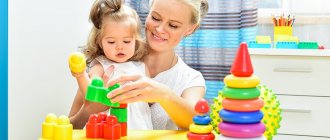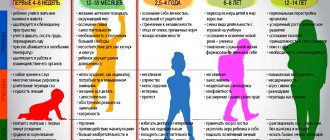It is best to start raising children from the first weeks of his life. From birth to one year, this is the time of active physical development of the baby, his adaptation to the environment and the acquisition of experience. It will take only twelve months for the baby to learn to smile, coo, recognize the voices of his parents, distinguish intonations and respond to their mood. During infancy, parents pay the main attention to maintaining a diet and proper care, but we must also not forget about raising the child. It is before one year that the baby’s basic habits are laid down on a subconscious level, his inclinations and personal characteristics are formed. The further development of the child largely depends on his upbringing until he is one year old. Conventionally, this period is usually divided into 4 stages, each of which covers three months.
Raising a child up to one year: four main periods
- From birth to three months.
- From three to six months.
- Six to nine months.
- From nine months to a year.
First period
The first stage lasts from the moment the child is born until he is three months old. During this period, parents must form good habits in the baby and prevent the emergence of harmful ones, lay the foundations of communication, and develop sensory perception. Also, during this period, parents need to properly organize their diet; this is important for normal weight gain and the formation of a habit of a diet. In the first three months, the baby should develop the following habits:
- falling asleep outside without a pacifier;
- hold head;
- spend some time in bed, entertaining yourself;
- show signs of dissatisfaction when it is necessary to change a diaper;
- fall asleep without motion sickness;
- navigate in space, responding to sounds and light.
Particular attention must be paid to the baby’s hygiene. Every morning should begin with a mother’s friendly smile and hygiene procedures. They consist of washing the face and hands, changing the diaper and washing. Daily procedures will form a healthy habit of cleanliness in your baby. It is unacceptable for residual urine or feces to irritate the baby's skin, so diapers should be changed every three hours. Since children's skin is very delicate, its surface is treated with cream or powder.
To form the habit of holding the baby's head, it is necessary to lay it on his tummy, even if he expresses dissatisfaction. Gradually, this procedure will become a habit for him, the muscles of his neck and back will be trained. Every day he will spend more and more time on his stomach and contemplate the world around him from a different position.
How to develop the habit of talking? In order for a child to start cooing, you need to play with him. It’s good that when the baby hears songs and nursery rhymes. Each action that is directly related to the child should be commented on, telling how to put on pants, a blouse, and how to change a diaper. When talking with your child, you should smile, this way a culture of communication will be established.
Important article: hygiene of a newborn baby
SO, the main tips and recommendations that you need to follow:
- For the normal development of the child’s psyche, it is necessary to constantly talk with the baby, sing songs, tell nursery rhymes, and turn on music to listen to. For the first games with the baby, it is worth choosing toys that promote the development of sensory perception;
- When the baby reaches the age of one and a half months, to strengthen physical health, it is necessary to lay the baby on his stomach every day, do exercises and massage;
- An important educational point is the need to teach a child to sleep in his own crib and spend some time in it on his own. (See useful material on how to teach a child to sleep separately);
- To prevent your baby from developing a bad habit in the future, do not allow him to suck his fingers.
Toys and games from 0 to 3 months
For babies up to 3 months, educational psychologists recommend toys that develop sensory, hearing, vision and coordination of movements:
- Rattles, bells, bells, etc. To develop hearing, ring a rattle in one ear of the baby, then in the other. Soon the baby will begin to turn his head towards the sound source;
- Bright toys made of various materials that you can grab and stroke. First, they are shown to the baby, stroked over the baby’s body, and placed in the baby’s hand. Soon the baby himself will begin to grab them and confidently hold them;
- A variety of mobiles (carousels) that are attached above the baby’s crib. Toys are placed at a short distance from the baby’s eyes (about 15-20 cm). See the article about music mobiles for the crib;
- Bracelet with a bell , which can be worn alternately on different hands;
- A balloon that can be tied to your hand. Soon the baby will understand that the ball moves thanks to the movements of his hand;
- Schematic representation of a human face . Babies love to look at such images. If you place the picture at a short distance from the baby’s eyes (approximately 25-30 cm), he will be interested in studying it while his mother is not around.
What else does a child need?
- Friendly family - happy children. At least 2 times a week, find time to gather all family members at a common table. Eating together in a special atmosphere (festive tablecloth, dishes) greatly helps strengthen family ties.
- Shared reading. Create a tradition of evening read-alouds where both children and parents are present. Choose the difficulty level of the text based on the older child if you have several children. Empathy for the main characters unites the family sensually. In the future, your children will not grow up as competitors to each other, but as best friends. And the emotional connection with your parents will last a lifetime.
- Why is the child sick? The body reacts to any psychological discomfort. The reason may be an unsuccessful parenting model if it goes against the natural properties of the child. And it happens that the mother’s serious conditions affect her - her anxiety, depression, irritability, apathy, resentment towards life.
- Moral education. How to raise a child to be honest, just, and merciful? How to educate him so that he accepts moral guidelines? This deep topic is raised in the article Moral Education, or How to Teach Freedom.
- Personal example. It works in all areas of life. Guess who can raise a happy person? It’s true that a good, happy future awaits those children who grow up with happy parents.
Proofreader: Natalya Konovalova
Author of the publication: Evgenia Astreinova, psychologist Editor: Tamara Tkachenko
The article was written based on materials from the training “System-vector psychology”
Second period
It lasts from the third to the sixth month, during which time active sensory, auditory and visual perception and development occur. The second stage includes preparing the baby for future speech. To do this, he can play music of different genres, the main thing is that it is light and melodic. Classics, children's songs, modern pop, folk motifs - everything will do. In order for the baby to hum, babble, and squeak, his attention must be paid to other sounds. The child needs to be introduced to the world around him, drawing his attention to the rustling of leaves, the chirping of sparrows, the sound of flowing water - this is where cognition lies (for example: here is the rain knocking on the windowsill, here are the birds chirping, but here is the rumble of a tractor, etc.) .
The mental development of a child of this age begins with communication. Parents should play with the child, developing his visual, tactile and auditory perception. You should start classes with your child during a period of active wakefulness, when the child is cheerful and nothing bothers him. Otherwise, the classes will not give the expected result. The child should enjoy the activity/game, so it should be abandoned if the baby is hungry, sick or naughty. During this period, the foundations of moral and aesthetic education are laid, which the child receives through communication with adults.
The joy and love given to the baby will become the foundation for the formation of moral and aesthetic education.
Massage and exercises must be included in a child’s daily routine. During this period, exercises become more varied and prepare the baby for crawling. We recommend looking at the massage section
Toys and games for ages 3 to 6 months
All toys that were used before the age of 3 months are suitable for playing with your baby. It is worth adding to them:
- Teethers and other toys for chewing and sucking, because at this time children begin to cut their first teeth (how to choose teethers);
- Easy to grip ball. Already at the age of six months, a toddler can play with him, sitting in a stroller or in his mother’s arms;
- Soft large cubes with various pictures on the edges. Kids are happy to grab them, toss them, and look at the pictures;
- Rubber and fabric figurines of various animals . At this age, it is useful to play the game “Who does what?” with your baby. We show the dog and voice it: “woof-woof”, etc. Soon the baby himself will “name” the toy using the appropriate sounds;
- Six-month-old children love to tear paper , give your baby old magazines and let him satisfy his curiosity;
- A finger show will be entertaining for the little one . Put finger toys on your hands (you can buy them in the toy department or make them at home) and put on a show for your baby;
- The baby begins to get to know his body. To do this, you need to show the little one and name parts of the body : eyes, ears, nose, legs, arms...
Psychology of raising a child up to one year old
The first month is the most difficult in life, both for the baby and for his parents. For almost forty weeks, the baby was inside his mother in a special aquatic environment, made no effort to breathe, and ate through the placenta around the clock. Having been born, he finds himself in a completely different contrasting environment. He learns to breathe, feels a different temperature, and the round-the-clock feeding is over. He's scared. Here the survival instinct is triggered, like all living beings, he begins to cry loudly to attract attention to himself, asks for salvation.
Third period
The third period in raising a child up to one year old covers the age from 6 to 9 months. At this stage, the toddler becomes restless and inquisitive. In children of this age, activity increases significantly. Since babies already know how to crawl, sit down, try to get up, and some even walk, it’s time to pay attention to physical training.
Give your child the opportunity to move freely around the house. To do this, it is necessary to secure all premises as much as possible (remove wires, breakable objects, household appliances). All children at this time strive to explore the contents of the cabinets. Do not interfere with the baby, just remove all dangerous objects and fill the cabinets with toys and things that the baby can play with.
For good physical shape, we continue to do exercises and massage, incorporating new movements and exercises.
You should not put your child in a walker; such devices for learning to walk are harmful to a fragile spine. All the PROS and CONS of walkers are described in this article. It's up to YOU to decide. The debate over walkers will never end.
At this stage, you can begin to potty train your child by sitting him down after sleep and feeding, before and after a walk. After some time, the child will understand why this is being done. We are reading a very useful article about how to properly potty train – https://razvitie-krohi.ru/razvitie-rebenka-do-goda/kak-priuchit-rebenka-k-gorshku.html
From about seven months, a child should be taught to wash their hands before eating. After some time, the baby will get used to this procedure and will independently place its hands under the running water. This is how the concept of cleanliness is developed.
By putting on a bib before feeding and immediately changing soiled clothes to clean ones, mom instills the habit of neatness. Moreover, parents must pronounce and explain each of their actions: walking around in dirty things is ugly and indecent, so now we are changing into clean clothes.
Teach your baby to eat with a bib, explaining why this item is needed. Wash your little one's hands before eating; this will eventually develop into a good habit.
After six months, children begin to teethe. To take care of the oral cavity, you need to purchase a special toothbrush for your baby, intended for children under one year old, and teach the little toothbrush to use it daily.
Play activities for a child are important at any age, not excluding the age up to one year. This is how kids learn about the world. From six months you can already show your baby palms and a bell, commenting on each movement. From seven to eight months they demonstrate how the simplest toys work: a ball rolls, the wheels of a car spin, a spinning top spins in one place. At the same time, you can begin to show parts of the face: nose, eyes, teeth, ears, forehead. Of course, understanding will not come immediately; first, children will find them from their parents and toys, and only then from themselves. You can come up with a simple song to which your child will be happy to demonstrate his knowledge. You need to work with children of this age every day.
At this stage, it is necessary to introduce the child to the words “no” and “impossible” . If a child fights while playing, you need to take his hands and say the word “no” with explanations (it hurts, I feel unpleasant). It is necessary to explain the reason so that the child learns to react to the forbidden word, otherwise he simply will not notice it.
Read an article on the topic: how to tell a child NOT to
Regarding the word “impossible”, look at the video:
Starting from 6 months, the child actively develops his first speech skills. Read poems and nursery rhymes to your baby, look at pictures, play little shows with toys, constantly talk to your child kindly and affectionately, without distorting the correct pronunciation of words.
Toys and games for ages 6 to 9 months
Pay attention to the new educational toys:
- Musical centers that develop auditory attention and coordination of movements. Often such toys voice various animals, musical instruments, etc. Show your baby how to press the buttons, he will quickly master the toy and play with it for a long time;
- Musical toys (pipe, xylophone, drum) help develop coordination of movements and auditory perceptions;
- Play centers for developing fine motor skills . Your little one will be happy to manipulate and study different shaped figures;
- Books made of fabric, plastic, cardboard will help develop understanding of speech, fine motor skills and cognitive interest;
- Bath toys . Ducks, boats, fish - these swimming animals develop cognitive abilities and motor skills (how to choose bath toys);
- Almost all children of this age enjoy playing in the kitchen with dishes . Share plastic containers, spoons, ladles, and molds with your baby.
The fourth period
Raising a child from nine months to a year covers all areas of the baby’s activity: during this period of time he actively communicates with adults and tries to walk independently. Encourage your little one when he stands up on his own. Lead the child, first holding both and then one hand. Finally, the moment will come when the child will be able to hold himself in a standing position for several seconds without support. Get him interested in this with a toy that needs to be placed in both hands. (teaching a child to walk - 10 important tips). You cannot forbid a child to get up where he is comfortable, otherwise he will feel that getting up on his feet is generally prohibited and will stop trying.
The mental development of a child consists of instilling the skill of performing actions with objects. You need to show your child how to beat a drum, roll a car, blow a whistle, pick up and eat an apple, etc. A theatrical performance with finger toys is good for developing a child’s imagination, memory and speech, even if they are the simplest.
Closer to one year, the child is introduced to the different shapes of objects, their sizes and materials. You can sort cubes with cubes, and balls with balls, looking only for wooden or plastic objects. It is easier to choose according to the ratio when a pyramid is folded or a matryoshka is assembled. How a child is surprised when inside one doll there is another, smaller one!
Full-fledged education includes close communication with the baby. You need to talk to your child constantly, but copying his speech and lisping is not recommended. In this way, you can provoke the development of a speech defect, which will then have to be corrected with the help of a speech therapist. The baby should not think that distorted sounds are correct; he should hear only clear speech.
Nurture in your child, through your own example and method of explanation, a kind attitude towards loved ones, animals and the world around him. Praise and encourage good deeds, stop negative actions. It is necessary to create a friendly atmosphere in the family, so the style of your relationship will become a model for the child. If during games a child begins to fight and push, you need to stop these actions without a smile, using the word “no” . The prohibition should sound strict and categorical so that the child pays attention to it and takes these words seriously. It should be remembered that children copy the behavior of the adults around them in everything. Sometimes it is the behavior of parents that provokes bad actions towards other children, so before introducing a ban, you should reconsider your behavior.
Continue your exercise routine by incorporating new exercises.
To develop speech, memory, and attention, continue to read poetry with your child (the best examples would be the works of A. Barto, K. Chukovsky), play finger games, arrange mini-performances with finger puppets, and conduct music classes.
Closer to the age of one, the baby should show various parts of his body, make “okay” gestures, wave “bye-bye”, learn to play with toys correctly (carry a car, roll a ball, blow a pipe, etc.). Teach your child to eat independently, first with his hands, and then use a mug and spoon.
Toys and games for ages 9 to 12 months
In the last trimester, the following toys for the development of babies will be relevant:
- Pyramids . By the age of one year, the baby can already string pyramid rings if he is shown how to do it;
- Cubes . Show your little one how you can build a tower out of them and then collapse it;
- Wind-up toys;
- Matryoshka dolls;
- The cars will be useful for both boys and young princesses. With their help, the baby should learn how to play with such toys correctly;
- A rocking horse and a rolling car , in which you can ride, pushing with your feet, will contribute to physical development;
- Rolling toys with a long handle will develop coordination and walking skills;
- An excellent tool for studying different parts of the face and body would be a large doll (preferably one made of soft material).
How to raise children correctly: rules relevant from birth
- Never force feed your baby. Not through persuasion, much less through threats or intimidation. You don’t want your baby to grow up sad and joyless, do you? Force-feeding in childhood does not leave its mark on the child’s psyche and affects him as he grows up.
- Mom, don't scream! Screaming is detrimental to the psyche of any child. The consequences are different and depend on the innate properties of the baby. An emotional, impressionable child, as a result of his parents’ shouts, risks remaining captive to fear for the rest of his life. And children who naturally have very sensitive hearing, as a result of screaming, withdraw into themselves and can develop mental disorders (autism, schizophrenia).
- Mommy, don't hit me! Physical violence can become the source of a child's tragic fate. For example, there are children whose skin is hypersensitive. When physically punished, they experience unbearable super-stress. To relieve pain, the body produces opiates - pleasure hormones. Subsequently, the child, without understanding why, deliberately “runs into” the belt in order to receive a new “dose.” And also, to relieve stress, he... steals. Want to know why?
- Find out exactly who is growing up in your area. Parents often have certain expectations of what a child should be like. Knowledge of the psyche will remove many questions that may arise in the process of education. The psychological properties that nature gave the baby are visible already in the first years of life. There is no point for parents to compare their baby with other children: the nimble owner of the skin vector will learn to run before others - but the child with the visual vector will be the first to please everyone with a smile, waving “hello” and “bye.” A serious sound artist beyond his years will speak later.











